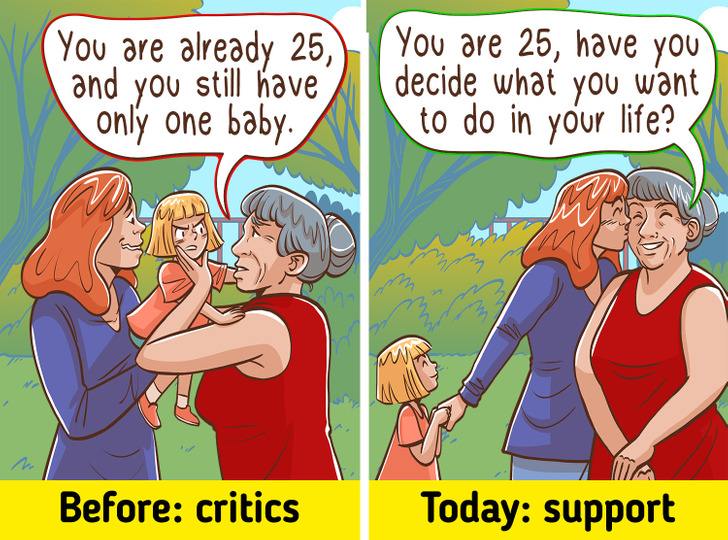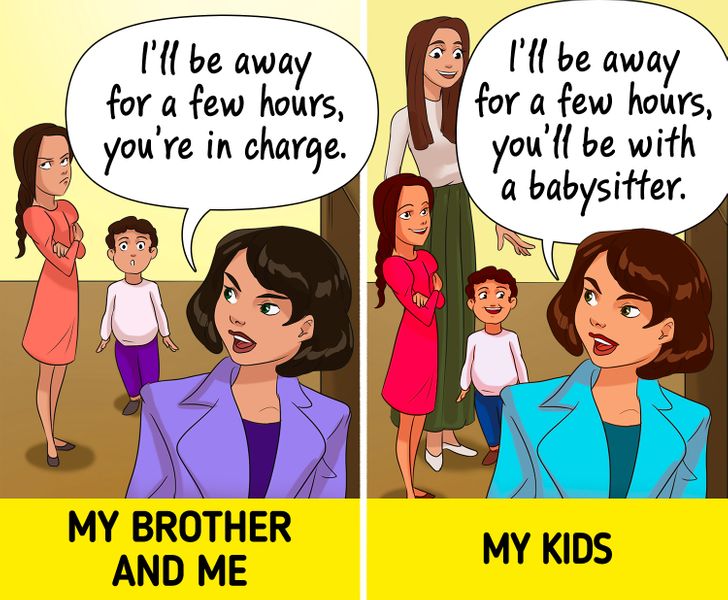These days, young parents have tons of information about raising kids. There are books, websites, and experts offering advice on every little thing. They can even get consultations from specialists whenever they need. But our own parents didn’t have all that. They raised us based on what they knew and what they learned from their own parents. So sometimes, the way we were brought up can seem really different from what we’re told is best now.
1. Early marriage and parenthood go without saying.

In earlier generations, there was often pressure on young adults to marry and start a family at a relatively young age, and to have more than one child a couple of years after the start of the family. Today, there is more emphasis on personal and career development before settling down. And moreover some researches show that early marriage can lead to some family problems, like dissatisfaction with married life, experience of having lots of responsibility, lack of independence in family life.
2. A college education is an indicator of your status.

«You can’t find a good job without going to college!» Many people must have heard this when they were teenagers. And lots of us believed this, but now don’t even know where our college diploma is. More than 41% of people that finished college have jobs that don’t require this kind of education. Today, employers are more interested in the practical skills of their employees rather than their qualifications.
When you finish school, it may be wise to take a gap year to understand what you really want to do and decide if you actually need a college education.
3. Classes are good for kids’ development — the more, the better!

A very tight schedule can exhaust children, which is obviously not good at all.
Famous American teacher Douglas Haddad recommends that parents slow down and give their children time to discover their own talents, and then decide if they need additional forms of education.
4. Being plump is healthy.

Children that always finished their meals were praised, and being plump was believed to be healthy. But bad eating habits formed in childhood often result in weight problems and eating disorders.
5. Money can’t buy happiness.

We wish this were true, but life says otherwise: money can make you happier, no matter what other people say.
Parents should teach their children the basics of budgeting. This will help kids form the right habits in money management and reach financial success in their adult lives.
6. Not standing out from the crowd means being good.

Traditional parenting often enforced strict dress codes and grooming expectations, particularly regarding modesty and conformity to societal norms. This might puzzle us today as modern parenting encourages children to express themselves through their clothing, appearance and let them express their emotions fully.
7. Older children are responsible for younger ones.

Very often, older children had to spend a lot of time taking care of younger ones. Parents had to work a lot and there was no other choice. But older kids had to sacrifice their time with friends and hobbies for the needs of their younger siblings.
Psychologists say that sometimes when kids have to perform the duties of parents, it may lead to psychological problems: they might not want to have their own children.
8. Women are housewives and men are breadwinners.

In recent decades, gender roles are not as important anymore. Women today can build successful careers and men can go on paternity leave and manage things around the house.
9. There’s nothing more shameful for a woman than having children without a husband.

Wrong, again. Today, there’s nothing surprising about single mothers and they’re not frowned upon as they were 30 years ago. Very often, having a child without a husband is an informed decision made by a woman. More than that, in the past 30 years, the number of single fathers has increased 1.5 times.
10. Storks deliver babies.

Some topics were never discussed — like when kids asked where babies came from, parents often said that they were delivered by a stork. Because of this, young people would often get into their first relationship without any knowledge of their bodies. They only based things off of the advice they received from their friends and bits of information from books and films. All these experiences could lead to bad consequences, including problems with both physical and mental health.
11. Children should be seen and not heard.

In the past, children were often expected to remain quiet and obedient in the presence of adults. Modern parenting emphasizes the importance of children expressing themselves and their opinions, because self-expression is a vital component of a young individual’s growth. The development of self-esteem and confidence in children is frequently nurtured by their capacity to express their feelings with clarity and authenticity.
Every parent has their own way of raising children. Just like how every family has its own special traditions, parents have rules they think are best for their kids. Sometimes, famous people, like celebrities, also share their ideas about parenting. They might talk about what works for them and their families. But in the end, each parent decides what’s right for their own children, based on love and what they believe is best.
The First Animal You See Reveals Your Most Persistent Personality Trait
Stubbornness isn’t one-size-fits-all; it comes in many forms and is often reflected in how we approach life’s challenges. The animal you notice first in the image below could offer insights into the unique way your stubbornness manifests.

1. Horse: Tireless Dedication

Horses symbolize an unwavering work ethic. They are known for their endurance, traveling long distances and performing heavy tasks. Their stubbornness often arises when they lack clear guidance.
If the horse caught your eye first, your stubbornness is tied to your work ethic. You push yourself relentlessly, sometimes ignoring your well-being, and thrive when working with clear and communicative people.
2. Bear: Reluctance to Change

Bears are persistent creatures, whether fishing for salmon or braving bee stings for honey. Their hibernation habits reflect their aversion to change.
If you noticed the bear first, your stubbornness lies in resisting change. You prefer to stick with familiar routines and strategies, adapting only when external circumstances force you to shift.
3. Giraffe: Strong-Willed Perspective

With their long necks, giraffes access food others cannot, but their height makes drinking water challenging. This distinctive perspective mirrors their tendency to hold steadfast views.
If a giraffe stood out to you first, your stubbornness is rooted in asserting your opinions. You may struggle to embrace opposing viewpoints, which can sometimes create distance in your relationships.
4. Camel: Fierce Independence

Camels are loyal but notoriously stubborn if mistreated. They refuse to cooperate unless treated respectfully and are known to hold grudges.
If the camel was the first animal you noticed, your stubbornness reflects a resistance to peer pressure. You stick to your principles and only follow others’ lead when you feel valued and respected.
5. Lion: Relentless Determination

Lions, symbols of pride and strength, are known for their perseverance. Male lions relentlessly pursue their mates, while lionesses tirelessly hunt to feed their cubs.
If the lion caught your attention, your stubbornness lies in your unyielding willpower. You live by your own rules and refuse to give up, especially when others depend on you.
6. Elephant: Resilient Strength

Elephants are icons of endurance and strength, capable of overcoming significant challenges. They use their resilience to carry heavy loads and clear obstacles.
If the elephant stood out to you, your stubbornness is marked by resilience. You face difficulties head-on and persist through hardships, confident in your ability to overcome them.
7. Deer: Passionate Drive

Though not the strongest animal, the deer’s speed and devotion to protecting its young highlight its resilience. Deer embody a passionate will to survive.
If the deer was the first animal you saw, your stubbornness reflects a passion for life. You approach challenges with determination, always striving to improve your circumstances.
8. Ox: Unwavering Confidence

Oxen are synonymous with hard work and determination. They are famously stubborn, digging in their heels when they don’t want to budge.
If the ox stood out to you, your stubbornness is rooted in self-assurance. You commit fully to your goals, and once you’ve made up your mind, nothing can deter you from achieving them.
Each animal represents a unique facet of stubbornness, offering a glimpse into how determination and persistence shape your personality. Which one did you spot first?



Leave a Reply